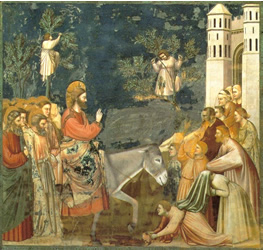 |
Christ
entering Jerusalem Giotto, c 1305, Arean Chapel, Padua, Italy |
The week leading up to Easter is the most solemn week of the Christian year; known as Passion or Holy Week*, it is a period of time during which believers recall the events of the last week of Jesus’ life. It begins on Palm Sunday, a name commemorating the manner of his arrival in Jerusalem:
The next day the great crowd that had come for the Feast** heard that Jesus was on his way to Jerusalem. They took palm branches and went out to meet him, shouting, “Hosanna!” “Blessed is he who comes in the name of the Lord!” “Blessed is the King of Israel!” (John 12: 12-13)
Jesus rode into Jerusalem on the back of a donkey, fulfilling, it was believed, an old testament prophecy:
Rejoice greatly, O Daughter of Zion! Shout, Daughter of Jerusalem! See, your king comes to you, righteous and having salvation, gentle and riding on a donkey... (Zechariah 9:9)
The people greeted him as though he were indeed an earthly king; shouting Hosanna, “save us,” they were hoping he would end the Roman occupation and restore a Jewish theocracy.*** But the events that subsequently unfolded led to an entirely different outcome; it would only be later, in the development of Christian belief, that Jesus would become regent of the spiritual realm, the cherished King of Heaven.
On Palm Sunday, in Anglican and Roman Catholic churches, members of the congregation hold small crosses made of palm, a memento of the palm leaves which the people of Jerusalem waved, and also the cross on which he died. The palm crosses are kept and burned at the start of Lent the following year to provide the ash for Ash Wednesday.
*In
1970, the Second Vatican Council approved a calendar which renamed Palm
Sunday “Passion Sunday”, a name previously applied to the
fifth Sunday of Lent
and initiating the start of a two-week period known as “Passiontide”.
This was marked in some churches with the replacement of purple Lenten
vestments with crimson ones. However
the new terminology has not caught on with the general public, the majority
of whom continue to refer to the last Sunday before Easter as Palm Sunday.
The
official liturgical calendar refers to the week leading up to Easter as
“Passion Week”, however Roman Catholic and Protestant laity
alike continue to refer to this period by its original name, Holy Week.
**The
Jewish feast of Passover. Jesus and his disciples also celebrated this
feast, during which, in anticipation of the events which were to follow,
Jesus re-interpreted the significance of the meal; Christians remember
this now on Maundy
Thursday, referring to it as the occasion of the ‘Last
Supper’.
***Literally, “the rule of God.” A form of political organisation
in which the government is based on religious offices.